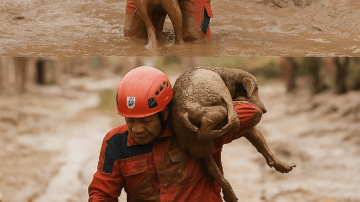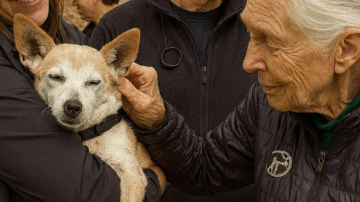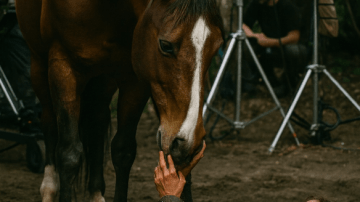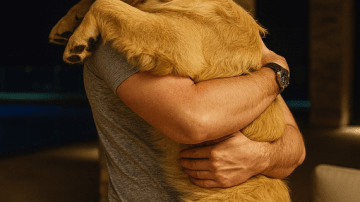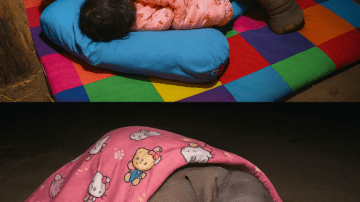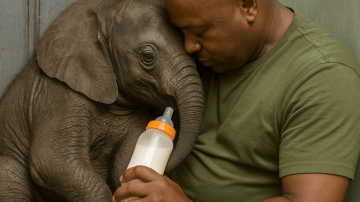For fifty long years, the only thing that touched Raju’s ankles were chains. Not soft grass. Not river water. Only cold, rusted metal that bit into his skin and claimed his freedom.

He had been born to walk under the open Indian sky. To follow forest trails. To pull leaves from tall branches and splash in muddy ponds. Instead he stood on hot pavement, day after day, under a sun that gave no mercy.
Raju was passed from one owner to another. Twenty seven in total. Each one found a new way to use him. To make him bow. To make him carry. To make him stand for hours while coins dropped into a tin he held out with his tired trunk.
Sometimes he carried tourists until his legs shook. Sometimes he was chained near temples so people could take photos. He was never allowed to rest. Never allowed to choose. Never allowed to be an elephant.

He was fed whatever his captors could find. Plastic bags. Paper. Scraps from the trash. His belly was often empty. His eyes always were.
Yet somehow Raju survived. Buried deep under the pain and exhaustion was a small spark. A quiet wish that maybe one day it would stop. That maybe one day the chains would fall.
That day came in July 2014.
A team from Wildlife SOS had been watching him for months. They had seen the wounds on his legs. They had seen how thin he was. They knew he was living a life that should never have been his.
They got legal permission to free him. But his last owner did not want to let him go. So the team planned a rescue at night. When the streets were quiet. When no one would stop them.
Under a pale moon, ten rescuers arrived with trucks, bolt cutters, and love. Veterinarians stood ready. Forestry officers stood beside them. They were nervous, not because of Raju, but because they had seen too many animals die before rescue came.
When they reached him, the sight took their breath away. Chains with spiked shackles wrapped around his legs so tightly that the metal had sunk into the skin. His body was covered in old wounds and fresh cuts. His ears drooped with defeat.

Raju looked at them with eyes that had seen too much.
They spoke softly to him. Telling him he was safe. That no one was going to beat him. That he would not have to beg anymore. They did not know if he understood their words. But he understood their tone.
Then something happened that none of them expected.
As they stood there, Raju began to cry.
Not in an angry way. Not with trumpeting. Real tears rolled down the sides of his face, wetting his wrinkled skin. The rescuers froze. One of them later said she had never seen anything like it.
It was as if his body was finally allowed to release fifty years of pain.
They began to work on the chains. It was not easy. The metal was old and fused with the skin. Every twist of the cutters brought both pain and freedom. They stopped often to let him rest. To stroke his trunk. To tell him to hold on.
Raju stood very still. As if he was afraid to move in case this was a dream. As if one wrong step would send him back to the life he knew.
After nearly an hour, the last chain fell. It hit the ground with a hard, ringing sound. A sound like an ending.
For a second nothing happened.
Then Raju took one step forward.
Just one.
Everyone watched, holding their breath. He lifted his trunk toward the night sky, as if tasting freedom. Some said he made a sound unlike anything they had heard before. Not quite a trumpet. Not quite a sob. Something in between. Something human.
He knew. He knew he was free.
They walked him slowly toward the transport truck. It was four in the morning. The world was quiet. Raju climbed aboard as if he had been waiting for this journey his whole life.
One of the volunteers placed a hand on his side and whispered, “You’re safe now.” He blinked slowly, eyes calmer than before. Maybe he believed her.
The drive to the Wildlife SOS Elephant Conservation and Care Centre near New Delhi took hours. The sun was rising as they traveled. For the first time in fifty years, Raju watched dawn come without chains around his legs.
At the sanctuary gate, people were waiting. Veterinarians. Caretakers. People who had fought on paper and in court and in silence for this one elephant’s freedom.
They washed his wounds. They pulled out the embedded pieces of metal. They treated infections that had been ignored for years. Then they brought food. Not trash. Not plastic. Real food.
Bananas. Melons. Jackfruit. Buckets of fresh water.
At first he ate slowly. Suspicious, as if food this good must be a trick. Then hunger and trust met in the middle. He began to eat properly. Mouthfuls at a time. He lifted his trunk again and again, accepting.
For the first time in half a century, Raju went to sleep with a full stomach.
Healing took time. Chains that deep do not disappear in a day. The wounds on his legs began to close, but the wounds in his heart needed time. He had forgotten what it felt like to walk without pain. To rest without fear.
At the sanctuary, he met other elephants. Maya. Phoolkali. Laxmi. They too had been rescued. They too carried their own stories. When they first approached him, he was shy. He kept his distance. He was not used to kindness.
But elephants are creatures of memory and mercy. They circled him, touching him with their trunks, breathing him in. As if to say, you are not alone anymore.
Little by little, Raju joined them.
Soon he was walking in open fields. Splashing in water. Throwing dust over his body to cool himself, not because someone ordered him to, but because he wanted to. He learned to rest under trees and let the breeze sway his ears. He learned to be an elephant again.
News of his rescue went around the world. People saw the photos of the crying elephant and understood that animals feel more than we admit. Donations poured in. Messages of love arrived from places Raju would never see.
Because of him, more elephants were rescued. Because of him, people began to question old habits. Because of him, kindness grew.
Years passed. Raju grew older. Today he is over sixty. His steps are slower, but his eyes are bright. He loves baths, eats well, and is surrounded by people who know his story and cherish him for it.
Visitors still ask about him. They stand near his enclosure and whisper, “Is that the elephant who cried?” And the keepers smile and say, “Yes. That is Raju. He cried when the chains fell.”
His tears were not weakness. They were truth. They were the sound of a soul recognizing freedom. They were a message for every person who ever thought cruelty does not matter.
Raju’s life reminds us of something powerful. Suffering can last for years. Even a lifetime. But one act of courage. One night of mercy. One choice to help. It can change everything.
Fifty years in chains. One night to freedom.
If an elephant can forgive. If an elephant can learn to trust again. If an elephant can cry from joy. Then surely we can learn to show compassion sooner. To speak up faster. To never walk past an animal in pain.
Because somewhere right now another Raju is waiting. Waiting for the chains to fall. Waiting for gentle hands. Waiting for someone to say, “You’re safe now.”
May we be that someone.

